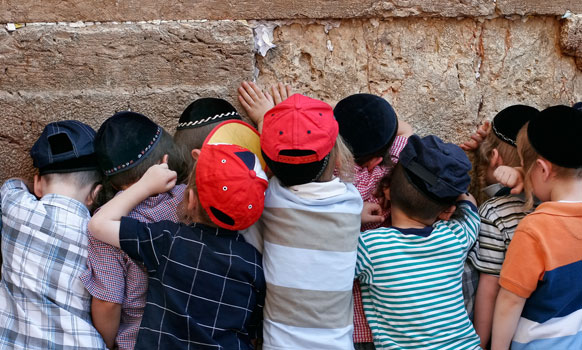
The Jewish Approach to Mindfulness Will Blow Your Mind
No longer confined to yoga and meditation enthusiasts, modern society is attuned to the benefits of mindfulness. Yet what does it have to offer the Jewish spiritual seeker? Jon Kabat-Zinn, a mindfulness-practice teacher, and developer of the Mindfulness-Based Stress Reduction (MBSR) technique, defines mindfulness as an “awareness that arises through paying attention, on purpose, in the present moment and non-judgmentally.” Mindfulness can also be translated into the Jewish concept of Yishuv Hadaas. Commonly understood to mean peace of mind, tranquility, and composure, it is in fact, a key aspect of Jewish living.
The Torah never explicitly requires a person to be tranquil. It is therefore merely viewed as something that, while extremely desirable, is not fundamental to Judaism. (In fact, the Torah rarely mentions the need to cultivate one’s character traits. Moses is said to be modest, Abraham is shown to be generous, but there is no set of commandments on character traits. While this omission is dealt with at length by the rabbinic commentaries, few if any would suggest that “peace of mind” takes primacy over any other trait.) A closer look at Yishuv Hadaas shows that it isn’t just another level to achieve in character refinement. It is indispensable for one’s entire spiritual life.
Serenity is counterintuitive to my nature, and therefore holds an inordinate appeal for me. I tend to be pretty excitable, and while this ability to be passionate is sometimes a gift, I frequently let my emotions get ahead of me. I would lament that I wasn’t born with the more stable, consistent personality of even-keeled individuals with Yishuv Hadaas. This regret or in extreme circumstances, shame, would be followed by a resolution to become more reserved in an attempt to disengage from life enough to reach a greater level of composure. This commitment usually lasted for a few days, and then dissolved. I resigned myself to accepting my character as it was. If one approaches Yishuv Hadaas as an immutable character trait or temperament that one is either born with or not, a person whose emotions are in a constant state of flux like myself will inevitably stop trying to achieve it. As I delved more deeply into the study of it, I discovered that it was actually within my reach.
The Hebrew language is unique in that it not only serves to describe an object, but also conveys the essence of what is being transmitted. The word yishuv means “settlement” and daas may be translated as “knowledge” or “awareness” – thus, “a settled awareness” which connotes the tranquility most people have come to associate with this term. But at its root, the word daas has a more profound meaning.
The mystics explain that the Torah’s first usage of a word serves as its archetype in the light of which all of its subsequent usages should be viewed. The first time that daas is used in the Torah is in the verse, “Adam knew his wife, Chava” (Genesis 4:1). Adam knew his wife not merely cognitively but in the most intimate sense. Daas thus indicates fusion, connection and unification. All other terms used to translate daas are derivations of this original meaning. The only way to know the essence of something is to unite and fully connect with it. Thus, Yishuv Hadaas means “settling into (unifying with) present moment awareness.” Using that definition, it becomes not only the description of a state of mind, but the means to cultivate a state of being. The key to being fully alive and at peace is to be settled in and connected to whatever is happening in one’s life, both internally and externally. Peace of mind can only come from a settled mind that is attached and attuned to whatever is happening here and now, not merely cerebrally, but viscerally.
Psychological research has demonstrated that the need to live in the present is as important as the needs to breathe, eat and sleep. Despite numerous studies that have demonstrated the ill effects on a person’s mind and body of regret over the past and anxiety about the future, this idea still seems out of reach to many. If we are constantly living somewhere other than the present, we cannot survive emotionally.
Judaism takes this one critical step forward. Jews have a fundamental spiritual need to cultivate and develop unity within the present moment and conditions. Even if a person drifts only slightly away from his present reality, he ultimately suffers as severely as a person completely fixated on his past or future. They both are not where they are “supposed” to be. As opposed to one who is consumed by anxiety or in the grips of a depressive episode, the affected soul might not immediately discern the harmful effects of such minor slippages, but as these accumulate, they will experience strain which can eventually be overwhelming.
What emerges from this is that Yishuv Hadaas isn’t limited in its scope – it is not “just” a praiseworthy character trait. It is a fundamental way of being that is indispensable for our most basic spiritual functioning and growth, not just something that can only be attained by a rare spiritual elite. Even a person who feels that he was created with a depressed or anxious disposition can achieve it. It takes practice, commitment, and dedication, but it is within our reach.
Rabbi Dr. Esptein recently published his first book, Living in the Presence: A Jewish Mindfulness Guide for Everyday Living from Urim Publications.
If you found this content meaningful and want to help further our mission through our Keter, Makom, and Tikun branches, please consider becoming a Change Maker today.








8 comments
Sort by
“Peace of mind, tranquility, and composure.. ” are a achieved when a Jew has Kavanah while Davening and concentrates when learning Torah.
And this author says it “is not fundamental to Judaism.”
It may be achieved but we are not commanded to do it.
100% Allison!
Of course we are commanded to work on having yishuv hadaas.
This is really the mitzva of bitachon.
To feel calm and at ease knowing that everything that happened was from Hashem and everything that will happen is from Hashem. All this with the knowledge that Hashem cares about us more than we care about ourselves.
Whether we feel calm or not is not in our control, but we are commanded to work towards having bitachon.
There are numerous sources that bitachon is not just an admirable and useful trait rather it is an obligation.
Just to quote one source Tehillim 62,9.
Another source is a pasuk in Yeshaya we say every day right before aleinu.
There are a number of biblical sources as well according to numerous early commentators.
“It is a fundamental way of being that is indispensable for our most basic spiritual functioning and growth, not just something that can only be attained by a rare spiritual elite.” Sounds to me like the author agrees with you, @Aliza. As I do, too. I’ve come to realize that kavanah when davening is the most spiritual and pure mindfulness practice possible to achieve.
The author wholeheartedly agrees with you. Since I am the author. Thank you all for taking the time to read this. #TheGoalisSoul
LeKavod Rabbi Dr, I funnily enough just read this now. I say funnily because I would have liked to have read it when it came out. Part of the baseline of the Mindfulness concept (as per Jon Kabat-Zinn) is acceptance. Acceptance of the moment. Acceptance of the present. Acceptance of your inner self. The tranquility is supposed to come as an outcome of the acceptance of (yourself) non judging. We tend to, in Judaism, relate to ourselves as how we are perceived to be Judged by God. Albeit a core principle in Judaism, it is not meant to be done all the time. Rather, we need to package that self judgement and focus on it once a day (as in the Chassidic Philosophical Strategy ) The rest of the time, we should have acceptance of ourselves in the moment. It is ok to be imperfect. It is ok to wrong. It is ok to make mistakes. It is ok to have negative emotions. The mindfulness strategy is not just an essence of tranquility in Judaism or ‘yishuv hadaas’. It is rather a pathway on how to innerly cope with your inner battles of adam lemakom adam leatzmo.
We are living in Queens, NY.
My son is 14 years old and has been diagnosed = ADHD AND IMPULSIVENESS. We are interested in Mindfulnes.
I saw your website and I would like to know how you can help us with our child, either virtually or in person.
I would be very grateful if you could inform us about you or to be able to refer to others so that it is in a personal way
Thank you very much
Shmuel Nisan